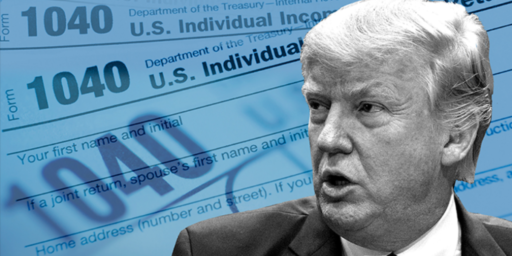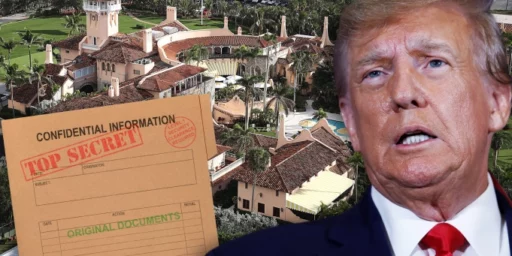Federal Judge Overturns Patriot Act Gag Rule
Judge Victor Marrero has again struck down a portion of the USA Patriot Act.
A federal judge struck down a key part of the USA Patriot Act on Thursday in a ruling that defended the need for judicial oversight of laws and bashed Congress for passing a law that makes possible “far-reaching invasions of liberty.” U.S. District Judge Victor Marrero immediately stayed the effect of his ruling, allowing the government time to appeal.
[…]
The ACLU had challenged the law on behalf of an Internet service provider, complaining that the law allowed the FBI to demand records without the kind of court supervision required for other government searches. Under the law, investigators can issue so-called national security letters to entities like Internet service providers and phone companies and demand customers’ phone and Internet records.
In his ruling, Marrero said much more was at stake than questions about the national security letters. He said Congress, in the original USA Patriot Act and less so in a 2005 revision, had essentially tried to legislate how the judiciary must review challenges to the law. If done to other bills, they ultimately could all “be styled to make the validation of the law foolproof.”
Noting that the courthouse where he resides is several blocks from the fallen World Trade Center, the judge said the Constitution was designed so that the dangers of any given moment could never justify discarding fundamental individual liberties. He said when “the judiciary lowers its guard on the Constitution, it opens the door to far-reaching invasions of liberty.” Regarding the national security letters, he said, Congress crossed its boundaries so dramatically that to let the law stand might turn an innocent legislative step into “the legislative equivalent of breaking and entering, with an ominous free pass to the hijacking of constitutional values.”
He said the ruling does not mean the FBI must obtain the approval of a court prior to ordering records be turned over, but rather must justify to a court the need for secrecy if the orders will last longer than a reasonable and brief period of time.
A March government report showed that the FBI issued about 8,500 national security letter, or NSL, requests in 2000, the year prior to passage of the USA Patriot Act. By 2003, the number of requests had risen to 39,000 and to 56,000 in 2004 before falling to 47,000 in 2005. The overwhelming majority of the requests sought telephone billing records information, telephone or e-mail subscriber information or electronic communication transactional records.
The judge said that through the NSLs, the government can unmask the identity of Internet users engaged in anonymous speech in online discussions, can obtain an itemized list of all e-mails sent and received by someone and can then seek information on those communicating with the individual. “It may even be able to discover the web sites an individual has visited and queries submitted to search engines,” the judge said.
[…]
Marrero had ruled in 2004, on the initial version of the Patriot Act, that the letters violate the Constitution because they amounted to unreasonable search and seizure. He found free-speech violations in the nondisclosure requirement, which for example, disallowed an Internet service provider from telling customers their records were being turned over to the government. After he ruled, Congress revised the Patriot Act in 2005, and the 2nd U.S. Circuit Court of Appeals directed that Marrero review the law’s constitutionality a second time.
This ruling strikes me as perfectly reasonable, if rather longwinded for a trial court judge (it’s 106 pages! [PDF of decision]). He didn’t invalidate the practice of issuing NSLs, which may well be a vital investigative technique, but rather the gag rule which “violates the First Amendment and the Constitution’s separation of powers provisions because it effectively prohibits recipients of the FBI letters (NSLs) from revealing their existence and does not provide adequate judicial oversight of the process.”
According to Dan Eggen‘s front page report in today’s WaPo, “The FBI says it typically orders that such letters be kept confidential to make sure that suspects do not learn they are being investigated, as well as to protect ‘sources and methods’ used in terrorism and counterintelligence probes.” This justification strikes me as rather silly, and surely insufficient to override fundamental civil liberties enshrined in the Bill of Rights. After all, the country was founded on the idea that certain rights were “inalienable.”
Jeralyn Merritt provides background on the NSL’s and the case. WaPo published a column by an anonymous victim of the NSL gag order in March.
Living under the gag order has been stressful and surreal. Under the threat of criminal prosecution, I must hide all aspects of my involvement in the case — including the mere fact that I received an NSL — from my colleagues, my family and my friends. When I meet with my attorneys I cannot tell my girlfriend where I am going or where I have been. I hide any papers related to the case in a place where she will not look. When clients and friends ask me whether I am the one challenging the constitutionality of the NSL statute, I have no choice but to look them in the eye and lie.
I resent being conscripted as a secret informer for the government and being made to mislead those who are close to me, especially because I have doubts about the legitimacy of the underlying investigation.
The inspector general’s report makes clear that NSL gag orders have had even more pernicious effects. Without the gag orders issued on recipients of the letters, it is doubtful that the FBI would have been able to abuse the NSL power the way that it did. Some recipients would have spoken out about perceived abuses, and the FBI’s actions would have been subject to some degree of public scrutiny. To be sure, not all recipients would have spoken out; the inspector general’s report suggests that large telecom companies have been all too willing to share sensitive data with the agency — in at least one case, a telecom company gave the FBI even more information than it asked for. But some recipients would have called attention to abuses, and some abuse would have been deterred.
Steven Taylor is right: “The situation is one that should be utterly unacceptable in the United States of the America.”
I’m willing to give the government some latitude in the war against terrorists, including allowing data mining and other broad intelligence gathering techniques with minimal intrusion on individual privacy. If, however, the FBI wants access to specific records of specific individuals, there’s simply no reason not to require them to get warrants and be subject to judicial oversight as required by the 4th Amendment. And the gag orders are repugnant on their face.






It is all but cliche now, but the terrorists will have really won if the public is willing to allow the government to “do anything to keep them safe.” I find that attitude detestable as well. The greatest crime of democracy is that those who would empower the government so much, out of a slavish fear for their lives, have the power to take down the real citizens with them.